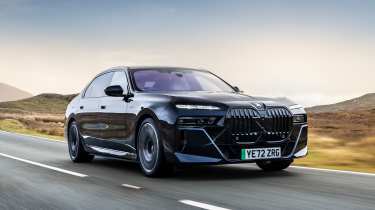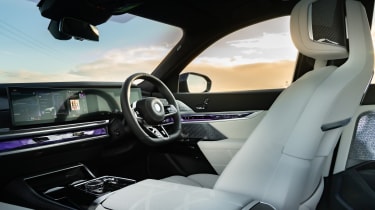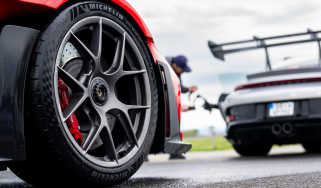BMW i7 xDrive60 M Sport review - EQS beater still can't match an S-class
BMW’s all-electric 7 Series limo has its rival beat but is that enough to make you hand over the keys to your IC engined limo?
Mercedes still dominates the limo world. In 2022 it sold 11,000 S-classes (down seven per cent on the year before) and 7500 examples of its electric EQS, taking first and second places in the European chart for F-segment cars (industry speak for limos). Meanwhile, the combined sales of the cars filling the remaining eight positions in the top ten fall short of the total achieved by just those two Mercedes. That’s gotta sting in the boardrooms when signing off a new rival to Stuttgart’s unbeatables.
Clearly BMW has an ample supply of Jungle Formula in its boardroom because it’s now on its seventh generation of 7-series, which is offered either as a plug-in hybrid with a 3-litre turbocharged straight-six petrol engine, or as an electric-only model, such as this i7 xDrive60.
Unlike Mercedes’ EQS and S-class, which sit on two very different platforms, all i7s use the came CLAR underpinnings regardless of powertrain. If experience of the Mercedes pair and BMW’s i4 has told us anything it’s that BMW has probably backed the right horse, the i4 driving nearly every bit as well as the 3-series it shares so much of its undercarriage with.
This electrically propelled i7 is equipped with a 105kWh battery, 101.7 of which is useable, and this drives two electric motors, one per axle, producing 269lb ft of torque at the front and 280lb ft at the rear, with a combined 536bhp. ‘Respectable’ best describes the performance, linearity placed over thumping great torque delivery, making the i7 feel exactly as you’d expect a large BMW limo to feel: calm, relaxed, unflustered. Its mid-range roll-on acceleration is more characteristic of an EV, with the instant slug of torque more noticeable, although not so uncomfortable as to disturb your passengers streaming something on the optional 31-inch theatre screen that drops down from the roof behind the front seats. Theatrical? Yes. The answer to a question not a single living soul asked? Undoubtedly.
With air springs and adaptive dampers the i7 rides, handles and steers far better than its electric Mercedes rival, its body movement and control more natural and 3D in execution compared to the one-dimensional approach the EQS takes. The BMW, thankfully, also has far, far superior brakes and regenerative braking, which are smooth, measured and balance well the needs of the driver wishing to slow and the battery to recoup some energy.
The i7’s interior quality is a step up from that of its predecessor and some rivals, even if some of the materials are clearly suited to new markets rather than existing ones. And it’s quiet; not silent, as there’s wind noise around the A-pillars you wouldn’t pick up with a straight-six humming away, but there’s next to no tyre noise, which is exactly what you want from a car like this. Although you’d also like it to be able to do more than 280 miles on a charge, but during our few weeks with it it got nowhere close to its claimed 385-mile range, which explains why the S-class remains at the top of the sales charts.
BMW charges from £110,000 for an i7 Xdrive60 and if you’re comparing purely on price you’ll need to take a look at Mercedes-Benz’s electric S-class, the EQS 450+ which is available in a quartet of trims starting with the £112,690 AMG Premium Line and rising to the £119,610 Exclusive Luxury model. All four give away performance to the BMW, with its 107.8kWh battery generating 354bhp driving only the rear axle compared to the BMW’s 105kWh battery generating 529bhp across both. Its range, however, is a much higher 484 miles, over 100 miles further than BMW’s claim for the i7. Mercedes’ next offering is the dual motor EQS53 with 658hp costing you from £161,860. We’ve yet to find a solid reason to walk past the i7 to get in an EQS either as a passenger or a driver.
Specs
| Battery |
105kWh (101.7kWh usable) |
| Range | 385 miles (WLTP) |
| Power | 529bhp |
| Torque | 449lb ft |
| Basic price | £110,000 |






